People of the theatre
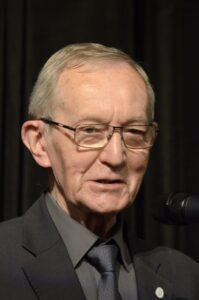
Prof. Lech Stefan Śliwonik
‘What I find more interesting is what is born and lives outside the institution – non-professional theatre. Why do people for whom theatre is not a profession pursue it with such passion? Why do they pursue it, sometimes at the cost of sacrifice?’ – wondered Lech Śliwonik in an interview with Paweł Płoski, journalist of the monthly magazine Theatre.
For more than thirty years, he has been leading the Assemblies of Rural Theatre Groups. In his book ‘Theatre Saved’ – he summarised 30 years of work by folk artists.
‘Folk artists have shown one thousand five hundred shows, about eight hundred ensembles have performed. The ritual forms are the closest to them – this is more than half of the shows. Their content is rituals, customs, but also work – for the peasant it is the same. Ploughing was a ritual, sowing was a ritual,’ says Lech Śliwonik. He believes that theatre culture is also about strengthening people’s conviction that what they do is important. That’s why actors of theatres or theatre shows abandoned their TV sets and started to tell and show their rituals to others. So that they don’t die.
Rural turns out to be an excellent laboratory for contemporary activities especially for older villagers, local cultural guides. It remains the best refuge of tradition, where one’s own scenarios can be realised, where people tell the truth about themselves, and where dialogues can also evoke dialect, singing, customs or past rituals.
It continues the work of Jędrzej Cierniak and Leon Schiller, who believed in the artistic potential of Old Polish ethnic culture and co-created regional or professional theatre drawing on folk traditions. In addition to its ideological predecessors, it reinforces the subjectivity of contemporary rural ensembles, their own explorations, and raises the importance of self-improvement among theatre groups themselves. This stems from Lech Śliwonik’s links with student theatre, and is served by the activities of the Theatre Culture Society, which he has headed since 1971, and held the position of President since 1987. With the help of the Ministry of Culture and Art, he has given the activities of rural theatre groups national importance, in the form of the annual (since 1984) All-Poland Assemblies of Polish Rural Theatres in Tarnogród (Lubelskie Voivodeship), preceded by district reviews.
Professor Śliwonik’s artistic and academic output is immense. He is a researcher and expert on student and alternative theatre, amateur, folk and school theatre. He created and defined the concept of ‘theatre for life’, and is involved in education and cultural policy. He is president of the Society for Theatre Culture and a lecturer at the Theatre Academy in Warsaw. He established the extramural study programme Knowledge of Theatre in 1987 and directed it until 1996. Privately, he is the brother of Roman Śliwonik, a writer and poet. He has also been a frequent juror of the Łódź Theatre Meetings, Wrocław One-Actor Theatre Meetings, and the All- Poland Recitation Contest. At the Malta Festival in Poznań (2006), he was chairman of the jury of the first edition of the New Situations Debut Competition.
Lech Śliwonik has been awarded the Officer’s and Commander’s Cross of the Order of Polonia Restituta and the Gold Medal for ‘Meritorious Service to Culture Gloria Artis’. He is also a laureate of the Oskar Kolberg Award in 2020.
Based on: nagrodakolberg.pl and the monthly magazine ‘Theatre’.
Source: Tarnogrod.info, sztetl.org.pl

Władyslaw Dubaj
How long can one stay active? It seems that this question does not apply to Władysław Dubaj, that the passage of time has no effect on him. Before he retired, he did a lot for folk culture, rituals, songs and the preservation of intangible heritage. He awakened people’s interest in folk culture and developed the skills to use it for theatrical activities. He was keen to save rituals from oblivion, such as the Mardi Gras, carnival, making garlands, walking with a star, weddings, baptisms, and also staging village chores – plucking feathers and sauerkraut pickling.
‘I was very keen not only to go to performances or festivals, but also to have as much going on as possible in our community centre. Among other things, I was thinking of a theatre review…’, he will say years later. The idea matured in 1974 in Stoczek Łukowski, where seymics of village theatre groups had been organised for four years. Tarnogród had a large and, for those times, well-equipped stage, a dedicated team of workers, and the help of the Provincial House of Culture in Lublin. And so, in February 1975, the first seismic event took place. It began with the participation of several districts and a few groups, staging a mainly dramatic repertoire. After the first difficult years, the participation of 14 – 16 theatres became the norm’.
Even in his youth he was interested in working with people. He managed the club of the Polish Association of the Deaf, where he taught theatre and dance and movement classes. After obtaining his diploma, he became associated with Tarnogród. And for a long time. He also gave reasons for his choice – this place had its own history and rich tradition, and the inhabitants treated culture in a special way. He was not idle: he introduced new forms of cultural activation for the community, events, new teams at the (then) village cultural centre – the Senior Citizens’ Club, the Fire Brigade Brass Band, a dance group, a vocal circle and an art club. The centre was recognised as a model institution. Others admired the new forms of activation and benefited from these experiences.
As a long-time president of the Tarnogród Regional Society and director of the Tarnogród Cultural Centre (1964-2008), he was invited as a lecturer and consultant, sharing his knowledge and experience. In Tarnogród he conducted training courses for instructors and animators of the cultural movement. And above all, he was active as an animator of folk culture, organiser and documentalist of the regional and national scene. It should be added that he was the 2018 laureate of the Oskar Kolberg Award in the category ‘Scientific, documentary activity, animation and dissemination of folk culture’.
He retired in 2008. He was awarded the title of Honorary Citizen of Tarnogród by the town and municipality authorities and residents.
Based on: nagrodakolberg.pl
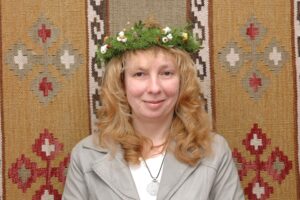
Renata Ćwik
Renata Ćwik – director of the Tarnogród Cultural Centre in Tarnogród, president of the Theatre Culture Society of Lublin Region in Tarnogród, board member of the Tarnogród Regional Society.
In 2008, she took over as director of the Tarnogród Cultural Centre. From now on, her main task becomes programming the activities of the institution and providing conditions for the teams working there and the events taking place. Renata Ćwik’s original idea is the ‘Painted East’ art workshop for students of the Academy of Fine Arts in the field of easel painting, ceramics and wood and stone sculpture. She is the author of the initiative and programme for the regional workshop on traditional Easter egg decorating, which is very popular.
The priority task of the institution and its director is undoubtedly the village theatre groups’ assemblies – interprovincial (from 1975 to today) and national (from 1984). A great deal of organisational effort, the economic care of performance conditions, the creation of a friendly atmosphere – contributes to the popularisation of the town’s history, its coat of arms and regional costume. She took over the organisational leadership of the regional assemblies of village theatre groups, and later also of the national assemblies. It was on her initiative that the District Children’s and Youth Theatre Review began to be organised – and gained a permanent place.
Several decades of assemblies yielded a beautiful result when in 2018. Minister of Culture and National Heritage Prof. Dr. Piotr Gliński included the sejmik – with number 1! – to the National Register of Good Practice in Safeguarding of Intangible Cultural Heritage. This required a great deal of documentation work by the director of the Tarnogród Cultural Centre. In the same year, Renata Ćwik’s efforts brought another success. Funding was granted from the Ethnopolska programme for the publication of another Sejmik book to mark the 35th anniversary of the Assemblies.
The current director of the Tarnogród Cultural Centre has taken good care of the centre and in 2021 the building underwent a major refurbishment, adding new studios, rooms and exhibition spaces, and above all a modern auditorium with professional lighting and sound system. The rooms and their equipment are used by the theatre groups during their performances, and the Centre also has an extensive collection of old props which are used by the participating groups.
An important and great achievement of Renata Ćwik is the documentation of the assemblies. For the past 40 years, every performance that has been shown has been described and recorded through publication in the annual newsletters. She has received many awards and distinctions for her work and particular commitment. The more important ones awarded in the last few years are: Cultural Award of the Lublin Voivodeship (2009 and 2017), Diploma of the Governor of the Lublin Voivodeship for activating the local community (2011), Award of the Voivodeship Cultural Centre in the category of Animator of Culture (2014), distinction for special commitment to the dissemination of culture in the Lublin Voivodeship awarded by the Board of the Lublin Voivodeship (2018).
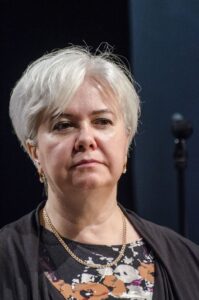
Katarzyna Smyk
Dr hab. Katarzyna Smyk has been a professor at the Maria Curie-Skłodowska University since 2000. She is particularly interested in: intangible cultural heritage according to the UNESCO 2003 Convention and cultural policy in the field of implementation of the Convention and statutory safeguarding of folk artists.
She has written or co-edited several author’s books on Polish rituals and customs and folk poetry. She has authored monographs on the Christmas tree, Corpus Christi and the work of Jan Pock. She is also the author of more than 130 scientific articles on various phenomena of intangible heritage and folk poetry. She has presented papers or lectures at more than 90 scientific national and international conferences.
Until 2023, Katarzyna Smyk was the chairwoman of the Council for Intangible Cultural Heritage at the Minister of Culture and National Heritage. Within the framework of her work at the Council, she contributed to the shaping of the system safeguarding of intangible cultural heritage in Poland, as well as to the implementation of the provisions of the UNESCO Convention, e.g. by building the National List of Intangible Cultural Heritage and participating in the work on applications for inclusion on the UNESCO Representative List of Intangible Cultural Heritage of Humanity.
She is the founder of the Chair of Intangible Cultural Heritage (2022) at the Institute of Cultural Sciences of the Maria Curie-Skłodowska University – the first chair in Poland dedicated to this heritage. She directs this chair. He also serves as secretary of the editorial board of the journal ‘ ’Folk Art. Quarterly of the Association of Folk Artists’.
Katarzyna Smyk is a member of the jury and the Artistic Council of the Assemblies of Polish Rural Theatres, evaluating performances in regional and national reviews and conducting workshops for theatre groups. She was the promoter of the entry of this review and the entire rural amateur theatre movement into the National Register of Good Practices in safeguarding of intangible cultural heritage. She was also the coordinator of this application. The entry was the first on the Polish list of good practices in 2018.
Professor Smyk works with many communities of bearers of intangible cultural heritage in Poland: in Spycimierz, Opole region, Rudnik nad Sanem, Mikstat, Husinka, etc. Author of the concept and implementer of research work in Spycimierz on the tradition of flower carpets for Corpus Christi in 2018-2022, combined with a series of workshops for the local community concluded, inter alia, with the pioneering development of a system safeguarding of intangible cultural heritage (Corpus Christi procession with the tradition of flower carpets in Spycimierz. Research report and recommendations to the safeguarding plan). She participated in the work on the application for inscription of the Corpus Christi tradition of flower carpets on the UNESCO Representative List of Intangible Cultural Heritage. Currently, she is assisting with lectures and consultations the community of Polish weavers trying to submit an application for inscription on the UNESCO List. She has organised several scientific conferences strictly dedicated to the UNESCO Convention and intangible cultural heritage.
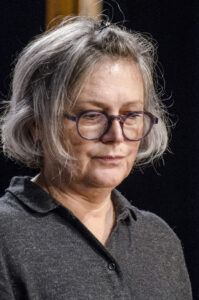
Bożena Suchocka – Kozakiewicz
Bożena Suchocka – Kozakiewicz is an actress, but first and foremost a theatre director, a specialist in self-presentation, a pedagogue and a professor at the Theatre Academy.
In 1985 she graduated in acting from the then State Theatre Academy in Warsaw and received a diploma in directing at the same Academy. In 2002-2008 she held the position of dean of the Acting Department of the Theatre Academy.
She made her debut in Andrzej Strzelecki’s original play ‘Bad Upbringing’ at the Ateneum Theatre, where she worked as an assistant director. In the same year, she played her two television roles – in the TV film ‘Day Four’, directed by Ludmila Niedbalska, and in the Television Theatre production ‘Several Scenes from the Life of Glebow’ (directed by Tomasz Zygadło). Her independent directing debut outside the academy was the 1995 production of ‘Brothers and Sisters’ based on a text by Gertrude Stein at the Dramatic Theatre.
Professor Bożena Suchocka is an outstanding director and teacher. She shares her knowledge during numerous theatre workshops with theatre enthusiasts, instructors, teachers and amateur actors, reciters and storytellers.
She has been involved in the Assemblies of Polish Rural Theatres movement for years. She sits in the Artistic Council of the All-Poland Assemblies of Polish Rural Theatres and the Artistic Council of the Interprovincial Assemblies of Rural Theatre Groups in Tarnogród. During meetings of the Artistic Council with amateur actors, she shares her knowledge and experience, teaches acting and gives advice. Thanks to her work and that of the other members of the Council, the acting and directing skills of the members of the village theatre groups have increased, the artistic level of the performances has risen and the folk theatre has been able to reach new heights. Together with Professor Edward Wojtaszek, they help adapt the performances nominated during the Assemblies of Polish Rural Theatres for the ZWYKI Festival of Rural Theatres to the stage of the Arnold Szyfman Polish Theatre in Warsaw. During the assemblies she runs workshops with young people, which contributes to awakening their passion for acting. It is thanks in part to her work that the sejmiks have continued to this day, and with them unique performances illustrating customs, annual rites, family rituals, fieldwork and household chores, folk traditions are cultivated. There is a chance that old folk customs and rituals will be saved from oblivion.
Bożena Suchocka is actively involved in the Theatre Culture Society in the Mazovian Branch, serving as its vice-president. She is co-organiser of the National Recitation Contest.
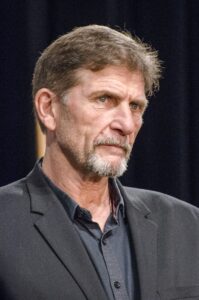
Edward Wojtaszek
Is an eminent theatre director, translator, lecturer at the Theatre Academy in Warsaw, he teaches workshops in Poland, Belgium, Norway and Morocco. He gained extensive knowledge of theatre , studying in Paris at the Institute of Theatre Studies at the Université Paris III – Sorbonne Nouvelle. A diploma from the Theatre Academy gave him the opportunity to enter professional theatre. He started directing as early as his third year. His artistic output is impressive. He worked in Warsaw theatres. Outside Warsaw he directed in the most important Polish theatres, among others in Olsztyn, Poznan, Torun, Szczecin and Gdynia. He taught at the Scenography Department of the Academy of Fine Arts in Warsaw and at the ISADAC theatre school in Rabat, Morocco, which ended with presentations of his diploma performances. He was awarded a postdoctoral degree.
Edward Wojtaszek’s activities contribute to the growth of interest in issues related to theatre, folk culture and drama. He conducts numerous theatre workshops for theatre enthusiasts, instructors and teachers running theatre groups, actors, reciters and storytellers.
For years, he has been involved in the movement of Rural Theatre Assemblies. He is a member of the Artistic Council of the All-Poland Assemblies of Polish Rural Theatres and the Artistic Council of the Interprovincial Assemblies of Rural Theatres in Tarnogród. During meetings of the Artistic Council with amateur actors, he shares his knowledge and experience and gives advice. Thanks to his work and that of the other members of the Council, the awareness of acting and directing among members of village theatre groups has increased, the artistic level of the performances presented has risen, and folk theatre has been able to reach new heights. Together with Professor Bożena Suchocka, she helps adapt the performances nominated during the Assemblies of Polish Rural Theatres for the ZWYKI Festival of Rural Theatres to the stage of the Arnold Szyfman Polish Theatre. During the assemblies he runs workshops with children and young people, which contributes to their passion for acting. It is thanks in part to his work that the assemblies continue to this day, and with them unique performances illustrating customs, annual rites, family rituals, fieldwork and household chores, and folk traditions are cultivated. There is a chance that old folk customs and rituals will be saved from oblivion.
He is president of the Theatre Culture Society in the Mazovian Branch and co-organiser of the National Recitation Contest.
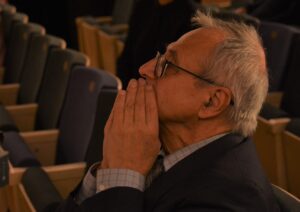
Piotr Dahlig
Musicologist, ethnomusicologist, professor of humanities (since 2015), professor at the University of Warsaw (since 2002), head of the Department of Ethnomusicology at the Institute of Musicology at the University of Warsaw (since 2003). Works on folk culture. Winner of the Oskar Kolberg Prize (2015).
Graduated from the Institute of Musicology at the University of Warsaw (1972-1977). Since 1975 he has specialised in ethnomusicology. In 1977-1983 he was an assistant at the Institute of Musicology, and since 1983 he has been a researcher at the Art Institute of the Polish Academy of Sciences (Department of Music History, Folklore Workshop), and for many years has been the custodian of the phonographic collections. Since the beginning of his work, the collection of recordings of folk songs and melodies of the IS PAN has been supplemented by his own recordings and field films. Their number is impressive – about 20 000 recordings of songs and instrumental melodies, about 500 hours of audiovisual recordings (recordings of dances, instrumentalists’ playing, folk performances and rural theatre) from all regions of Poland and neighbouring countries. Piotr Dahlig consistently follows the idea of documenting and researching the musical culture of Poles.
He is a member of the International Council for Traditional Music (UNESCO), the Society for Music Education, the Warsaw Scientific Society TNW, the Polish Folklore Society, the Fryderyk Chopin Society. He has lectured at the University of Tampere (Finland), the Academy of Music in Warsaw, the Nicolaus Copernicus University in Toruń on musical cultures and music (ethnic, folk) of Polish and European nations, as well as on the theory of music education. Juror of many folklore competitions in Poland, including the National Festival of Folk Bands and Singers in Kazimierz Dolny nad Wisłą, the All-Poland Assemblies of Polish Rural Theatres in Tarnogród.
He is the author of five books, 160 articles on folk culture, entries in encyclopaedias, essays for CD booklets, e.g. for the ‘Music of the Sources’ series (Polish Radio Publishing House). Piotr Dahlig’s main works include: Folk musical practice in commentaries and opinions of performers in Poland, Warsaw 1993, Musical traditions and their transformations. Between Folk, Popular and Elite Culture of Interwar Poland, Warsaw 1998, Music of Advent. The Mazovian-Podlasie tradition of playing the ligawka, Warsaw 2003, Cymbalists in Polish culture, Warsaw 2013, dedicated to the musical traditions of the Podkarpacie region and to the displaced persons from the eastern lands of the Second Republic of Poland who settled after 1945 in the western and northern lands of contemporary Poland.
Source: https://www.nagrodakolberg.pl
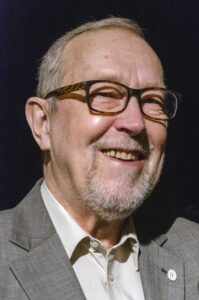
Jan Zdziarski
Linguist, theatre instructor, retired lecturer at the Aleksander Zelwerowicz Theatre Academy in Warsaw. Vice-president of the Theatre Culture Society (TKT), for more than 30 years associated with the Assemblies of Rural Theatre Groups. Since 1990, stage host: ‘Voice of the Tarnogród Assemblies’.
Jan Zdziarski has been an organiser, coordinator and juror of the National Recitation Contest for over 40 years. He is a member of the judging panel at theatre festivals and at many different recitation competitions in Poland. Organiser and author of programmes for word and theatre workshops, conducts classes on speech culture, recitation and directing in non-professional theatre.
Together with Professor Śliwonik and other members of the TKT board, Jan Zdziarski created the organisational structure and programme of the Assemblies of Polish Rural Theatres (5 district assemblies and the All-Poland Assemblies of Polish Rural Theatres). Thanks to the long-standing efforts of the TKT board, the assemblies as an event have become a permanent fixture in the calendar of regional and national events, the performances from year to year are on an increasingly higher cognitive and artistic level, and thanks to the assemblies it is possible to ‘save from oblivion’ rituals and customs of villages from various parts of Poland. It is to people like Jan Zdziarski that the assemblies have lasted and rural theatre has flourished.
